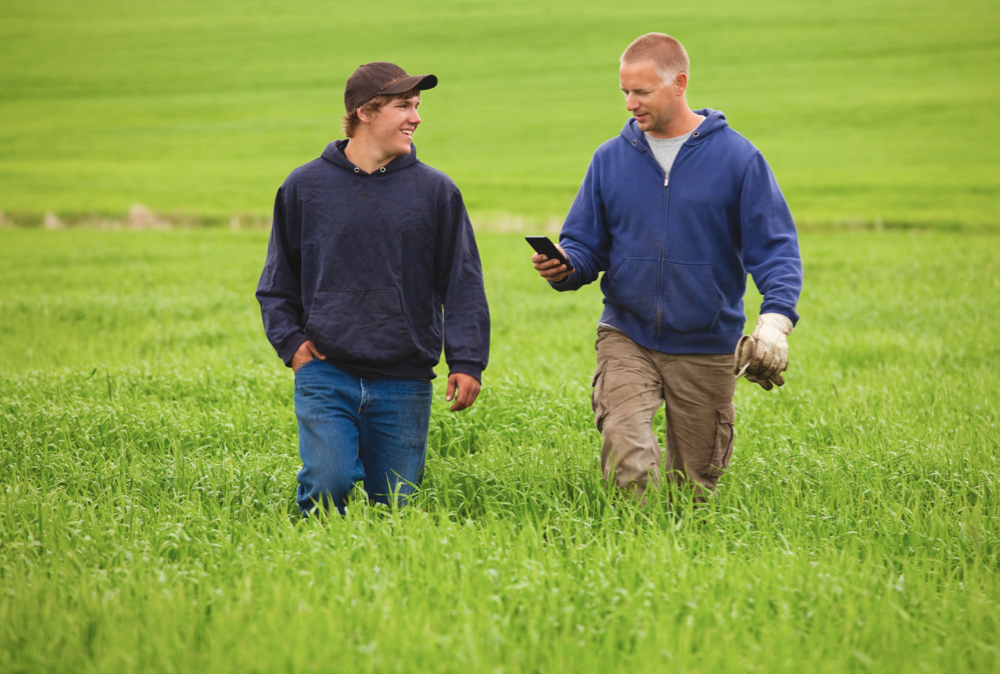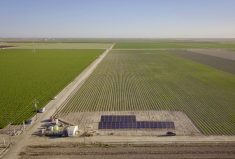In the September issue of Country Guide I wrote about the Avaaz movement’s effort to ban glyphosate in “The Target is Glyphosate“. As I reported then, if you haven’t heard of Avaaz, you should go to its website today. The prestigious Guardian newspaper says Avaaz (whose name means “voice” in several European languages) is the world’s most powerful online network of environmental activists.
In just five years, Avaaz has amassed a membership of almost 44 million people, and it is still growing. Thousands of dedicated volunteers are overseen by core teams on six continents, and one of their key objectives is to force glyphosate off the market.
Read Also

Riding the tariff rollercoaster
Farmers are accustomed to roller-coaster years. But the current geopolitical windstorm is something else entirely. On his cattle operation near…
Reader reaction to my initial column ranged from a real fear that glyphosate is in danger to a sort of dismissal that such a ban could ever happen here.
Unfortunately, it is already happening in countries around the world, and the list keeps get longer… and closer to our agriculture. Sri Lanka has already banned the use of glyphosate, and El Salvador and Malta have passed laws banning glyphosate, although those laws have not yet come into effect. Bermuda has banned the import of glyphosate, and Colombia has outlawed the use of glyphosate for eradication of illegal coca plantations grown for cocaine production.
The Netherlands has already banned the use of glyphosate for home garden use, and France has passed legislation to ban home and garden use of glyphosate by 2022. As well, Brazil’s government is currently debating a ban on glyphosate.
Importantly, activists in those countries are getting inspiration from Canada.
The Pesticide Action Network in the U.K. has published an extensive list of regions globally which have banned glyphosate, and its list includes “Canada — eight of 10 Canadian provinces have in place some form of restriction on the use of non-essential cosmetic pesticides including glyphosate. These cannot be used in public areas or by the public out of doors.”
The list gets a lot longer when you consider the many Canadian municipalities that have enacted bylaws banning pesticides for cosmetic use (which in many cases includes glyphosate). The Pesticide Free B.C. website provides links to 40 communities in that province alone which have banned pesticide use.
To find out why there can be strong support for such bans, I emailed and talked with a number of activists.
The activists
I simply wanted to know who are the activists, the environmentalists, and the Canadian Avaaz members who support a glyphosate ban in Canada, and why are they so convinced that they are in the right when they argue that glyphosate use should be discontinued?
Priscilla Judd of Lumby, B.C. is likely the type of person most farmers picture when asked who they think wants a ban on glyphosate. She is a self-described activist and supports a number of environmental and social causes.
Judd also signed the “Independent Scientists Manifesto on Glyphosate” which calls for: “… governments at all levels to ban the spraying of glyphosate herbicides. As professionals who have read the literature of glyphosate herbicides and their effects we have concluded that they are causing irreparable harm.”
Judd also describes herself as: “survivor of a pesticide violation.” She is not only opposed to the use of glyphosate, she opposes the use of all pesticides. “Organic is the future. We have to go organic; it is sustainable!”
But Judd is especially opposed to glyphosate. In our interview, she talks of maps she has found on the Internet showing the vast area of North America which grows GMO crops, and she firmly believes that glyphosate kills everything including beneficial soil microbes, leaving the soil dead.
Judd has participated in the March against Monsanto, she has been active in the creation of a GMO-free zone around her community, and she blogs about the dangers of conventional agricultural practices.
She is also a singer/songwriter who profits from promoting and selling her anti-GMO and anti-Monsanto songs and CDs online.
As another example, Peter Subda of Courtney, B.C. has supported a number of Avaaz initiatives including the call for banning glyphosate. He has a master’s degree in electronic engineering and is an organic farmer. He says “glyphosate is a horrible substance and should not be used by farmers and homeowners. They do not know how much damage it does.”
Subda also believes glyphosate is a much more persistent chemical than Monsanto claims. He cites lectures that he has attended by Dr. Thierry Vrain as well as information he has read online.
“People have lived for millennia in harmony with the environment, so why do we need to screw around with something that does so much harm?” he asked me. “We are driving ourselves into extinction.”
Robert Abell of Kanata, Ont. also signed the Monsanto Manifesto. He is at the other end of the spectrum, with a PhD in science education and background in chemistry.
Abell says he has carefully studied 50 to 60 papers that raise issues about the safety of glyphosate, and he can quickly recite reports saying glyphosate remains in the environment longer (up to seven years in soils and oceans) than industry and government want us to believe.
Abell talks of documented health problems in places like Sri Lanka and Ecuador where populations that have been exposed to glyphosate have much higher rates of some diseases.
Abell says he “simply does not trust mainstream research.” He feels the peer-review process is broken, and that regulatory oversight by government has been compromised by industry interests.
“Glyphosate destroys the land. It degrades the soil,” he believes, and he also sees dangers in the development of glyphosate resistance in plants.
Mostly he is concerned about the increase in chronic disease that correlates closely with the increase in glyphosate usage. He points out that glyphosate is an antibacterial agent and therefore is likely to have an impact on the bacteria in the human gut. He feels this could have profound effects on health.
In the middle, meanwhile, are those like Joe Kiceniuk who spent over 20 years as a toxicologist in Nova Scotia. Kiceniuk signed the call for a glyphosate ban because he feels it is no longer being used appropriately. He is dead against the use of glyphosate as a desiccant in food crops. In fact he says he is opposed to any use of glyphosate in the human food chain.
Kiceniuk says 80 per cent of our health-care budget is now spent on the treatment of chronic non-communicable diseases like heart attacks, cancer, and diabetes. He feels sublethal exposure to pesticides is part of the reason for such health problems. He points out that glyphosate residue is now found in everything.
“I am not opposed to the proper use of glyphosate outside the human food chain. Farmers must read the instructions and know what they are doing when applying any pesticide. They have to realize this is dangerous stuff. It must be kept out of the food chain.”
Resisting the glyphosate ban
The question is, what are Canada’s farm groups doing to save glyphosate? Here is what I found out:
CropLife Canada is “the trade association representing the manufacturers, developers and distributors of plant science technologies, including pest control products and plant biotechnology” in Canada. President and CEO Ted Menzies described the push for a ban on glyphosate as a “blind attack.” He said that proponents calling for a glyphosate ban have not talked with farmers about the benefits glyphosate provides. “Glyphosate is an amazing tool which allows farmers to grow more food. It has minimal toxicity, and there is nothing better or safer for farmers to use.”
The primary strategy taken by CropLife Canada is to reach out to grower groups and organizations, saying, “We urge farmers to share their story, to tell how the use of glyphosate has enabled zero tillage and resulted in improved soils, and how there would be millions more acres under the plow without glyphosate.”
Menzies says CropLife Canada provides farmers with training in using Twitter and social media sites to tell their personal stories. He suggests farmers “don’t dwell on the negative.”
Instead, he says, farmers should explain how you share the goals of the public, and that you want to farm sustainably and produce healthy food, which is why you use glyphosate. “Tell your story,” he says. “Be proud of what you do.”
Ron Bonnett, president of the Canadian Federation of Agriculture feels there is a real risk of municipal glyphosate bans, and even at the provincial level. He explains that pesticide approval and registration at the federal level is very much evidence based, and the PMRA does a good job at ensuring pesticides are effective and safe. However, decisions at lower levels of government are often based on opinions rather than hard evidence.
Bonnett says agriculture needs to build public trust. “We need to start to tell the story of how today’s pesticides are better than the older products they have replaced. That story is not getting out.”
Yet Bonnett says it is very difficult for agriculture to tell its story in the face of misinformation that activists can spread with a short tweet or Facebook post.
As another example, James Battershill, general manager of Keystone Agricultural Producers in Manitoba, says farmers must inform the public about glyphosate, how it is used, and the benefits it provides.
Battershill says we must make sure the public knows that if glyphosate isn’t protected, farmers will have to use more pesticides not less.
Farmers also need to explain that the adoption of zero tillage only happened because of pesticides like glyphosate, he says, and that without glyphosate tillage would again be required, resulting in erosion and soil degradation.
As well, the public needs to be told that the risks from glyphosate are not what they are being made out to be by those seeking to ban its use, Battershill says: “Glyphosate provides benefits both for farmers and the general public.”
Norm Hall, president of the Agricultural Producers Association of Saskatchewan says APAS has not taken any action against the potential banning of glyphosate at this time. However, he added: “Farmers need every tool… we will do everything in our power to fight against a ban of glyphosate or any other tool in our tool box.”
Yet possibly the most interesting reply came from Shannon Scofield, executive director of the Agricultural Federation of Alberta. The AFA immediately put the issue to its board, which issued the following statement:
“We (AFA) feel that Avaaz, and other activist groups like it, do pose a serious threat to the modern agriculture practices that many Canadian farmers have adopted. However, the bigger threat may be that oftentimes consumers are turning to biased and incorrect information sources as a basis for their food choices, rather than sound, scientific evidence. Recently, we have seen examples of this in many different sectors of the industry, from the marketing of hormone-free meat as a healthier food choice to the vilification of GMOs.”
“Canadian farmers rely heavily on export markets,” AFA’s board also said. “Glyphosate bans in any of the countries that we currently do business with could drastically change how we operate.
“This is our livelihood,” the AFA board said. “We cannot allow organizations like Avaaz to be the loudest.”
Glyphosate and sustainable agriculture
I must clarify a statement I made in “The Target is Glyphosate” in the September issue of Country Guide. Poor wording created the impression that I believe glyphosate is used in organic production. This is not the case.
Kate Storey, Manitoba Organic Alliance president correctly pointed out “Glyphosate is not a Permitted Substance in organics and is not permitted for use in organics.”
In the article, I had meant to refer to growers who have both conventional and organic production systems, but I did not make this clear. A dual-system producer can use glyphosate in their conventional crops, but not in areas certified organic.
I apologize for this error and for any issues it has created.
The ‘Risk-Monger’
Dr. David Zaruk is an environmental health risk research analyst at the Facultés Universitaires Saint-Louis, Brussels, and he blogs under the pseudonym “The Risk-Monger.”
In March of this year, Zaruk listed 10 reasons why glyphosate is a good herbicide (expanded versions of each of these points can be found in his blog post at risk-monger.com).
His 10 reasons for defending glyphosate include:
- Controlling invasive weeds leads to better agricultural yields.
- Better yields = less land in production = more meadows and biodiversity.
- Extremely low toxicity levels compared to (organic) alternatives.
- Allows for no- or low-till farming — better for soil management.
- Reduces CO2 emissions (compared to organic).
- Glyphosate saves lives.
- It is much more affordable and effective than other options.
- Glyphosate is off patent so no single company is profiting heavily from it.
- Glyphosate-resistant crops allow for more ecological weed management practices.
- There is overwhelming scientific evidence that glyphosate is safe for humans.
Similarly, Dr. Steve Savage is an agricultural scientist out of California who blogs under “Applied Mythology.” In his March 15, 2015 post “Why Organic Can’t Fulfill Our Food Supply Ideals” Savage says: “But increasingly, the “natural” constraints of organic are making it difficult or even impossible for organic farmers to implement what we now know to be best for us, best for the environment, or best for the food supply.”
Even the “Father of Organic Gardening” in Texas, Malcolm Beck wrote in 2001: “Nature could approve of glyphosate if used properly in some conditions.” In the published article he argued that the tillage that organic producers rely on is an unsustainable farming practice.
(Note from Gerald Pilger: As a producer, I applaud the market that organic has created and is profiting from. However I am troubled by both organic growers and conventional growers attacking the agronomic practices and tools each use to create equally safe and nutritious food for the public. If only everyone would market their production in an honest way; explaining truthfully the virtues of the food they are producing rather than seeking market share by denigrating production methods of other farmers. In a hungry world there is certainly room for both farming methods!)
















